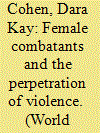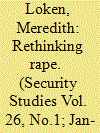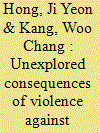|
|
|
Sort Order |
|
|
|
Items / Page
|
|
|
|
|
|
|
| Srl | Item |
| 1 |
ID:
121906


|
|
|
|
|
| Publication |
2013.
|
| Summary/Abstract |
Much of the current scholarship on wartime violence, including studies of the combatants themselves, assumes that women are victims and men are perpetrators. However, there is an increasing awareness that women in armed groups may be active fighters who function as more than just cooks, cleaners, and sexual slaves. In this article, the author focuses on the involvement of female fighters in a form of violence that is commonly thought to be perpetrated only by men: the wartime rape of noncombatants. Using original interviews with ex-combatants and newly available survey data, she finds that in the Sierra Leone civil war, female combatants were participants in the widespread conflict-related violence, including gang rape. A growing body of evidence from other conflicts suggests that Sierra Leone is not an anomaly and that women likely engage in conflict-related violence, including sexual violence, more often than is currently believed. Many standard interpretations of wartime rape are undermined by the participation of female perpetrators. To explain the involvement of women in wartime rape, the author argues that women in armed group units face similar pressure to that faced by their male counterparts to participate in gang rape. The study has broad implications for future avenues of research on wartime violence, as well as for policy.
|
|
|
|
|
|
|
|
|
|
|
|
|
|
|
|
| 2 |
ID:
153937


|
|
|
|
|
| Summary/Abstract |
There is widespread variation in scope, scale, and forms of rape across and within conflicts. One explanation focuses on the integration of women in armed groups. Scholars and international organizations posit that the inclusion of women in armed groups discourages wartime rape. They advocate women's increased participation to combat rape and other forms of civilian violence. Using an original dataset of women's involvement as combatants in civil wars from 1980 to 2009, I argue that the participation of female fighters has no significant impact in constraining an armed group's propensity to rape. Female combatants do not lessen rape because organizational factors, primarily culture, drive violence in armed factions and encourage conformity irrespective of individual characteristics. Advocating further militarization of women in an attempt to reduce conflict-related rape may be an ineffective policy prescription.
|
|
|
|
|
|
|
|
|
|
|
|
|
|
|
|
| 3 |
ID:
146134


|
|
|
|
|
| Summary/Abstract |
In this article, I am concerned with the political agency available to victims of wartime violence, and the subsequent insights it generates for thinking about complicity and responsibility. The article first considers the problematic ways in which victims are cast in the discipline of transitional justice, drawing on interdisciplinary studies of gender, agency, and wartime violence. I conceptualize the political as relational and situated within a web of human relationships that make life meaningful. Political agency includes acts, gestures, and words that negotiate the value of human life within various relationships. To illustrate, I turn to the life story of Sara, a young woman who grew up in the context of prolonged conflict in northern Uganda. I conclude with thinking about how Sara's acts of political agency move us beyond static categories of victims in transitional justice, and conceive of responsibility as diffuse and socially held.
|
|
|
|
|
|
|
|
|
|
|
|
|
|
|
|
| 4 |
ID:
156421


|
|
|
|
|
| Summary/Abstract |
In this paper, we examine the extent to which wartime violence against civilians during the Korean War affects people's current attitudes toward South Korea and other involved countries. Using a difference-in-differences (DID) approach that compares the cohorts born before and after the war, we find that direct exposure to wartime violence induces negative perceptions regarding perpetrator countries. As many of the civilian massacres were committed by the South Korean armed forces, prewar cohorts living in violence-ridden areas during the war demonstrate significantly less pride in South Korea today. In contrast, postwar cohorts from those violent areas, who were exposed to intensive anti-communist campaigns and were incentivized to differentiate themselves from the victims, show significantly greater pride in South Korea, and greater hospitality toward the United States than toward North Korea, compared to prewar cohorts in the same areas and to the same cohorts born in non-violent areas.
|
|
|
|
|
|
|
|
|
|
|
|
|
|
|
|
|
|
|
|
|